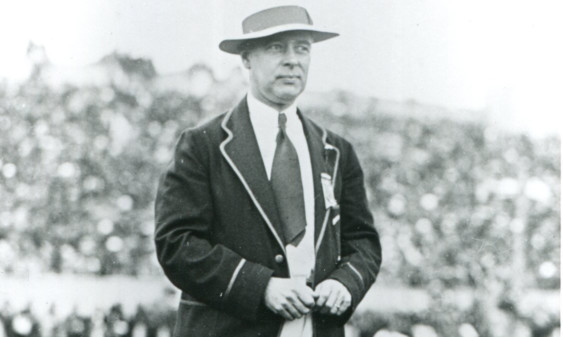
2014 has been meticulously planned 1930 was the work of just one man.
The record crowd jostled to catch a glimpse of the biggest draw of the day.
At just 25, strapping aristocrat Lord David Burghley was a household name after winning gold at the Olympics two years previously.
More than 17,000 spectators had crammed into the newly built Civic Stadium in Hamilton, Canada to see him compete in the inaugural British Empire Games of 1930.
As well as gold in both
hurdling events, Burghley who inspired the character of Lord Lindsay in Chariots of Fire would win gold in the 4×440 yard relay race.
Yet despite his and other athletes’ undoubted sporting prowess, the 1930 British Empire Games was a decidedly amateurish affair, which came very close to never going ahead at all.
The slick Commonwealth Games showcase that rolls into Glasgow this week bears little resemblance to the original 1930s Games it came from.
Now, 6,500 athletes from 71 nations will compete in 261 events in 17 sports over 11 days.
It is an event that has grown over 84 years to become the second biggest multi-sport festival in the world with which sponsors pay handsomely to be associated.
The Glasgow event has taken an army of organisers seven years to plan all the minutiae associated with this summer’s Games.
But, back in 1930, it took just one man and a large measure of willpower to bring it to life for the first time.
M.M. Robinson is a name that is fondly remembered in his native Canada but largely forgotten across the rest of the Commonwealth.
Yet without him the Games would never have got off the ground.
The idea of Empire countries getting together to compete in sports had been floated since the 1890s but had never come to fruition.
However, in the aftermath of the hugely successful Amsterdam Olympics in 1928, Empire officials agreed the time was right.
Canada was chosen with the small city of Hamilton picked as host.
It was largely due to Canada’s team manager at the Olympics, M.M. Robinson, affectionately known as a Bobby, and rather less so as “the Little Napoleon of Sport”.
He edited a newspaper in Hamilton and was desperate to bring the get-together there.
He cajoled, bullied and harassed officials into agreeing, and largely organised the event himself. But his plans were close to being scrapped at the 11th hour.
After two years of preparation, England announced they wouldn’t be sending a team.
The end of the roaring twenties and onset of the economically troubled 1930s meant English organisers couldn’t afford to send a team to Canada.
Without England, the British Empire Games were doomed to failure.
“In that case,” said Robinson, “we will have to do the next best thing. If Britain won’t play with us, we will have to turn south to the United States.”
The threat was to prove a political masterstroke. Worried their international stock was plummeting with the
emergence of the US as a new superpower, Britain agreed to send a team to the one-off event.
In August 1930, just 400 athletes from 11 nations made their way to Hamilton to compete in six sports aquatics, athletics, boxing, lawn bowls, rowing and wrestling over two weeks. Women were allowed to compete in just the swimming.
Athletes like Lord Burghley slept two dozen to a classroom in the primary school that acted as their athletes’ village with the whole event costing just $97,000.
That’s just under £750,000 in modern money. By comparison Glasgow 2014 will cost around £500 million.
It proved such a success, reluctant officials had little choice but to agree to hold it every four years at different cities across the Empire.
It’s why, while toasting Glasgow’s success at hosting the event this summer, we should all raise a glass to the Little Napoleon of Sport.

Enjoy the convenience of having The Sunday Post delivered as a digital ePaper straight to your smartphone, tablet or computer.
Subscribe for only £5.49 a month and enjoy all the benefits of the printed paper as a digital replica.
Subscribe